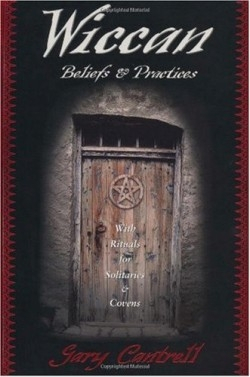
Wiccan Beliefs and Practices
With Rituals for Solitaries & Covens
What do Wiccans, followers of the Old Religion, really believe? In honoring the gods and connecting with the sacred, what exactly do Wiccans do and how do they do it? This book answers these questions and more, providing a philosophical, ethical, and practical framework that a fledgling solitary Wiccan or a newly born coven can use to form rituals and spells.
Cantrell, coven high priest and author of Out of the Broom Closet, used his own experience of a spiritual path that took him from a simple reverence for nature to the study of witchcraft and finally to his position as a priest of Wicca to create this primer.
Many “how to” books on Wicca recommend a structure to follow, involving formal initiation and a coven of at least thirteen members. In the author’s experience, such a formal structure often is not available, and indeed may not always be the best way to proceed. The path to the old gods can wind through a period of solitary or small-group study, or of trial and error. It is to this audience Cantrell offers his “Book of Shadows,” a Wiccan’s documentation of spells and rituals.
He also provides the basic ethical worldview of Wicca: for example, the Wiccan Rede that states that as long as Wiccans pay mind to harming none, they can pretty much do as they will, and also the Rule of Three that says “what you send out comes back to you.” The Wiccan must bear this in mind, for the Old Religion places a heavy weight upon personal responsibility.
Both casual inquirers and serious students of the “Craft of the Wise” will find real treasure in Cantrell’s book. The instructions on how to draw the circle that divides the worlds, how to call the quarters, and ways of observing the Celtic pagan sacred days are clear and easy to follow. Many rituals are pragmatic, such as a spell the author used to prevent his dog from barking at other animals while on leash (bind the dog’s undesirable habit in “knots of three” and call upon the Welsh Goddess Turrean, protector of small animals, to aid the spell).
Cantrell presents an eclectic approach. In his view, the Wiccan novice can experiment and discover techniques that work best for the task at hand. His book provides the framework; it is up to the reader to bring the spells and rituals to life.
Reviewed by
Carol Lynn Stewart
Disclosure: This article is not an endorsement, but a review. The publisher of this book provided free copies of the book to have their book reviewed by a professional reviewer. No fee was paid by the publisher for this review. Foreword Reviews only recommends books that we love. Foreword Magazine, Inc. is disclosing this in accordance with the Federal Trade Commission’s 16 CFR, Part 255.
